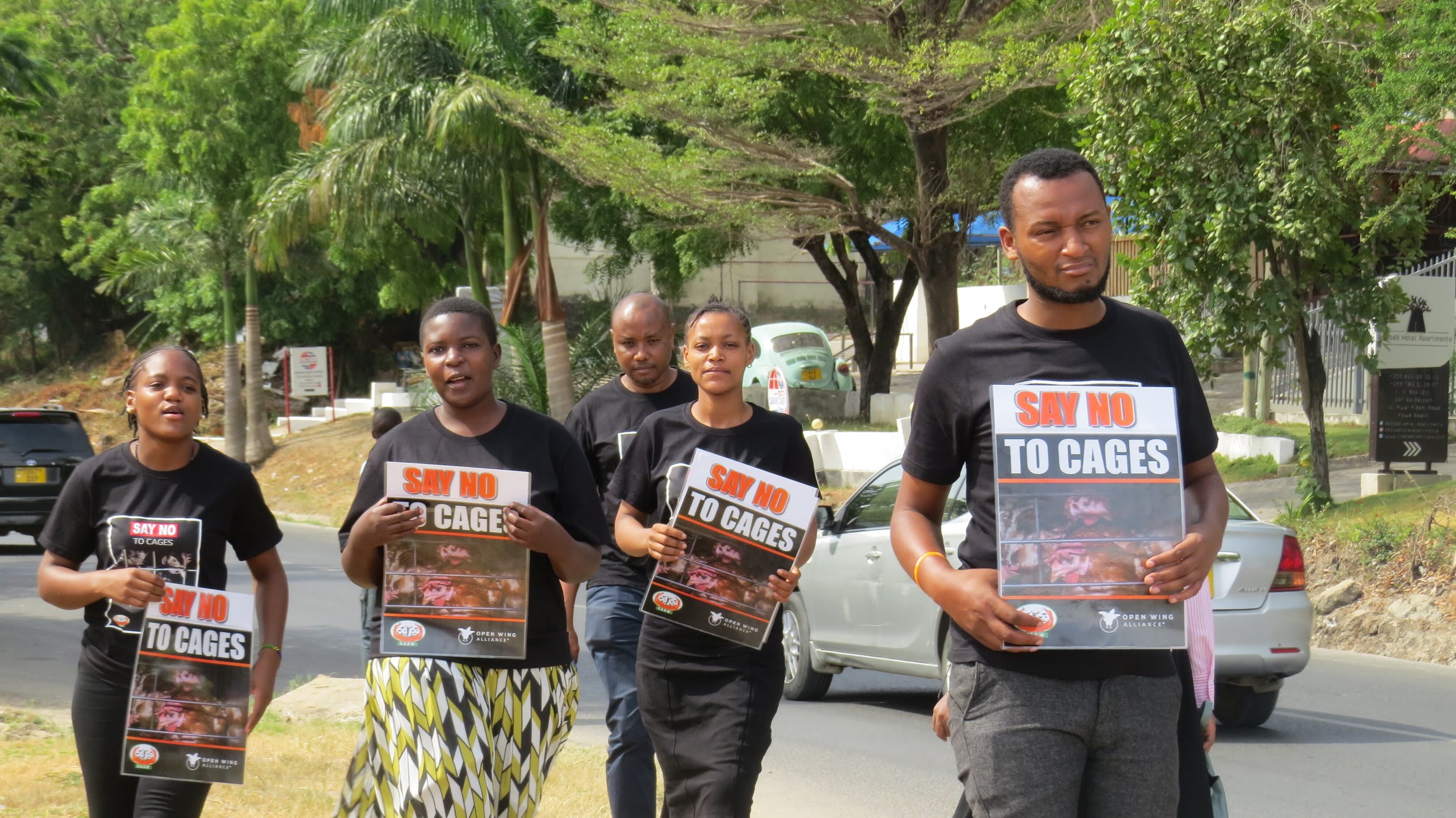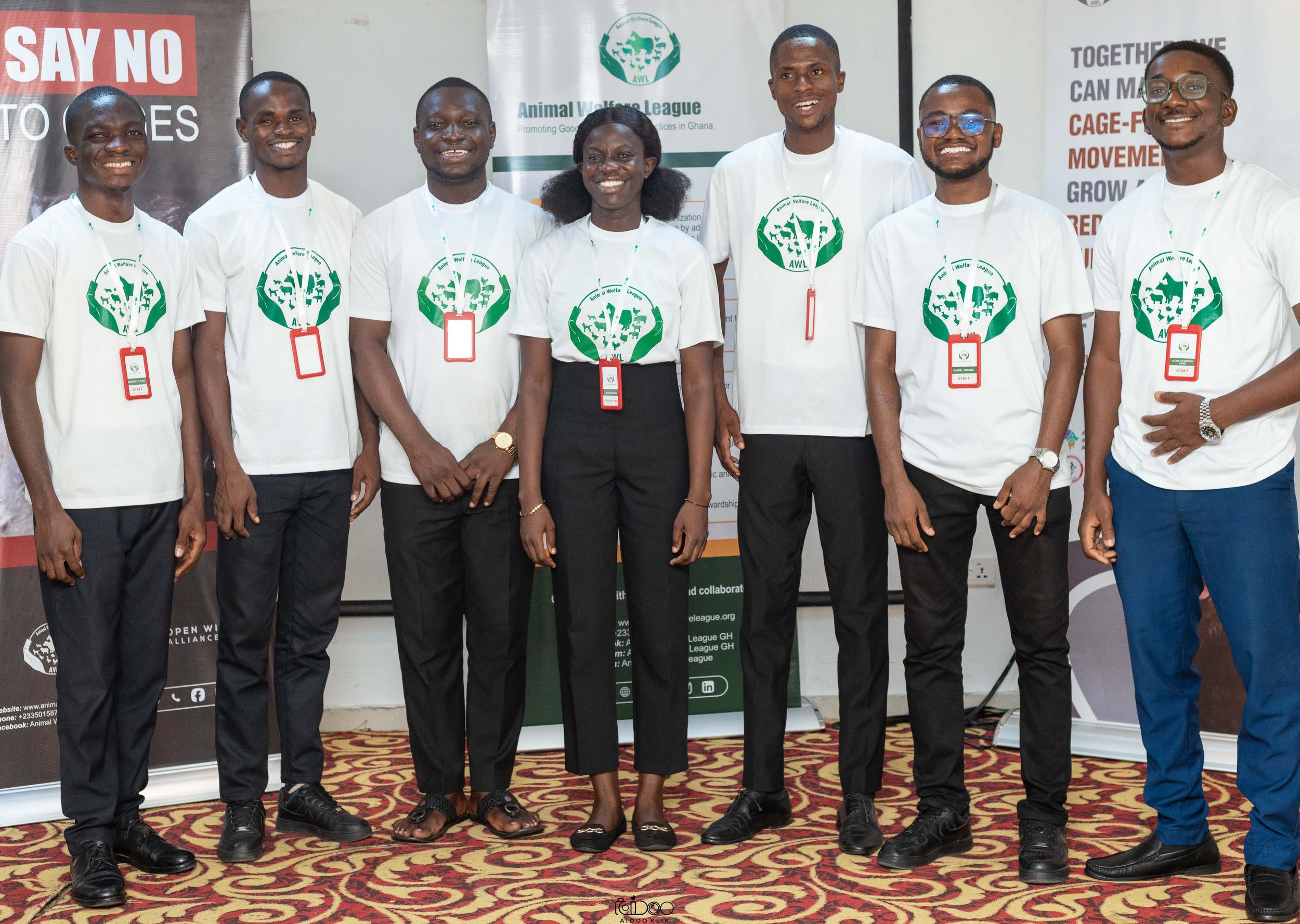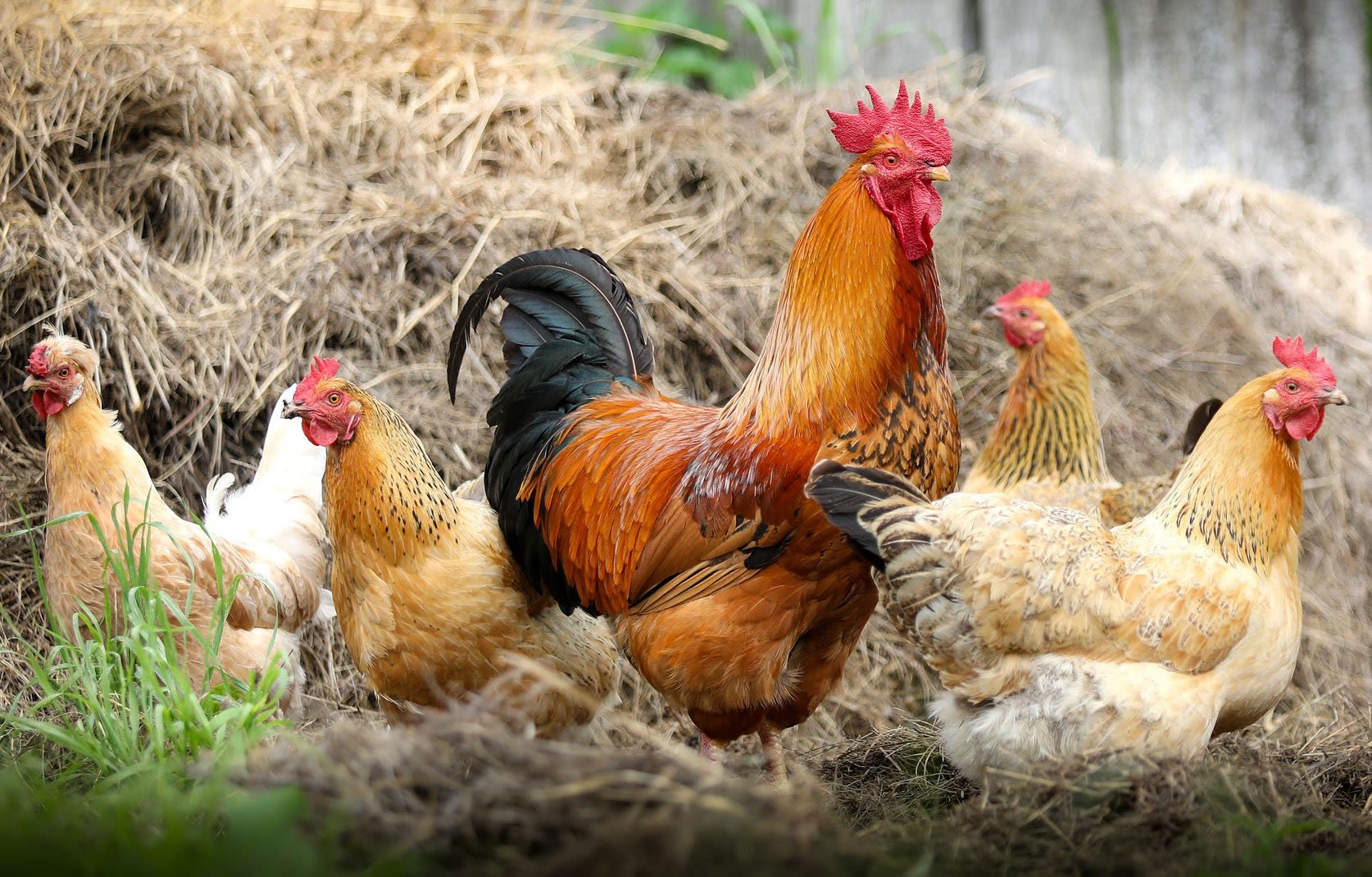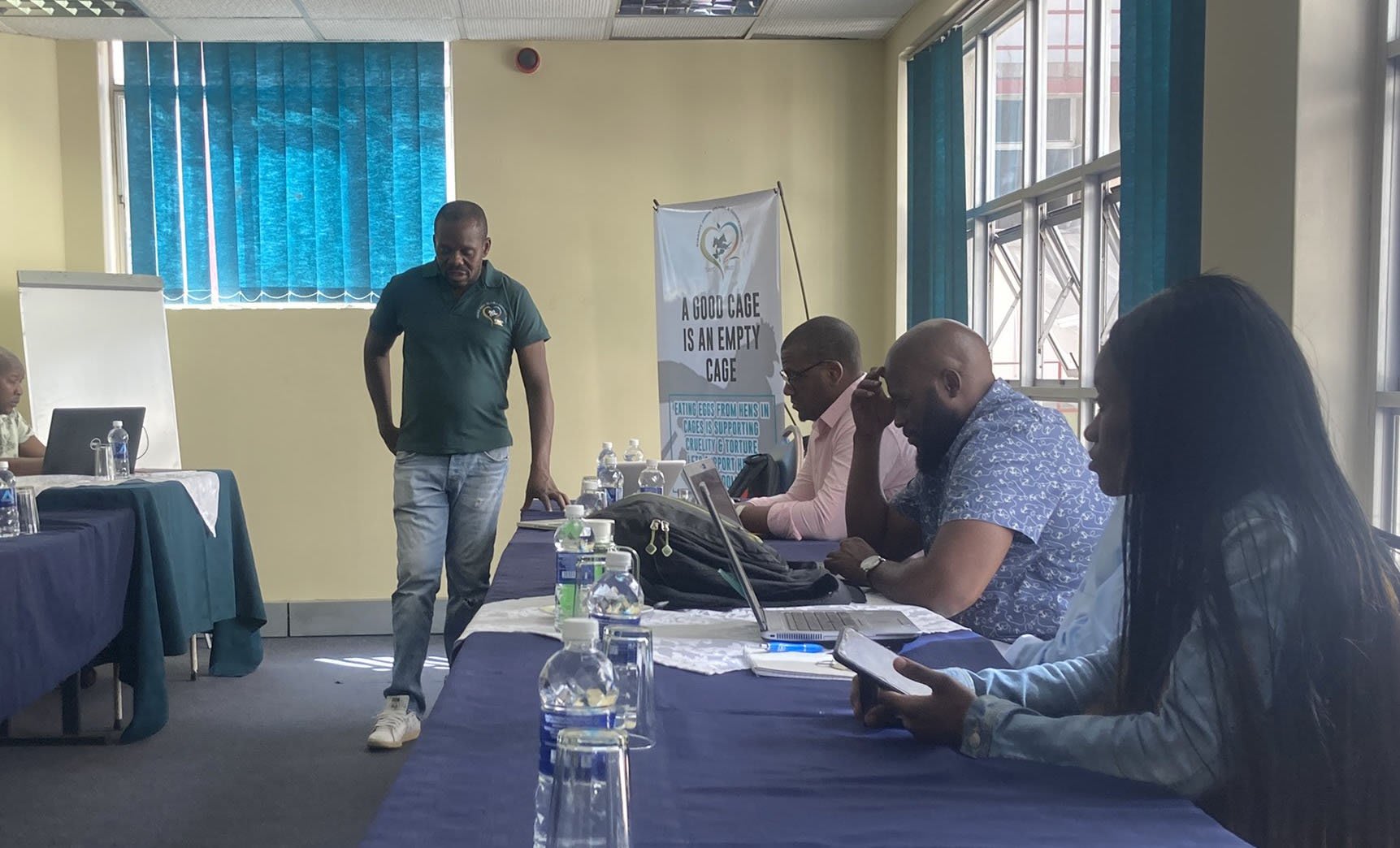Running Cage-Free Projects in Africa: Case Studies of Three African Animal Advocacy Organisations
By AnimalAdvocacyAfrica, Aurelia Adhiambo, Animal Welfare League @ 2024-03-01T06:30 (+37)
Written by Ayubu Nnko, @Daniel Abiliba, Alfred Sihwa with @Aurelia Adhiambo and @AnimalAdvocacyAfrica.
Disclaimer: This post was originally published on our website in May 2023. We decided to post this on the EA Forum now in order to make the post accessible to the wider EA audience. Circumstances and details may have evolved since our original publication, and any statements made herein are reflective of the context at that specific time. We encourage our audience to refer to the latest updates and developments from the organisations for the most accurate and current information.
The cage-free movement is increasingly gaining momentum all over the continent. More consumers, international organisations, and activists are calling for the ban of cruel battery cages which are detrimental to animal welfare, and pose serious threats to public and consumer health. At the core of this important work in Africa are passionate and dedicated animal advocacy organisations, many of whom are small, under-funded yet vibrant groups working hard to eradicate battery cages. Open Wing Alliance and Animal Advocacy Africa work with three of these organisations, Education for African Animal Welfare from Tanzania, Animal Welfare League from Ghana, and Sibanye Animal Welfare and Conservancy Trust from Zimbabwe, who shared their experiences with us.
Education for African Animal Welfare: Tanzania

Ayubu Nnko, the founder of EAAW, has done cage-free work since 2018 and helped open up the cage-free movement in Tanzania. EAAW translated the Cage-Free Fulfillment report by Open Wing Alliance and the International Cage free equity index produced by Mercy for Animals in Kiswahili and shared it with poultry farmers and media houses in Tanzania for publication. EAAW has also participated in cage-free campaigns globally, regionally, and locally, leading media campaigns in Africa involving local restaurant chains and examining international brands in Tanzania. EAAW has undertaken journalist training on the cage-free movement and engaged poultry farmers through farm visits and discussions about free-range poultry farming.
What are your successes, milestones, and features in cage free work?
Public sensitization and engagement has so far been our greatest strength as EAAW. We have done this through the following ways:
- Social media campaigns: We have reached 148,707 people through social media and 48,015 through our YouTube channel. Besides, we have featured in sixteen print media publications, four live and recorded television programs (ITV, CAPITAL TV, TVE and TBC), three live and recorded radio stations broadcasted different messages on the cage-free movement, (Capital Radio, TBC FM and Safina FM) and 98 calls and 175 SMS where different questions on cage-free vs caged farming were answered.
- Producing and designing animated videos: We have produced 13 animated videos (locally translated into Swahili), 15 comics, 12 ordinary videos and eight banners, all of which are freely available on our YouTube channel.
- Radio and print media outreach: Beyond social media, our work has also been featured in ten newspapers and eight electronic media platforms in Tanzania. As a result, we successfully organised and implemented the first journalists training workshop in Tanzania earlier this year.
Beyond media work, we have also conducted door-to-door campaigns, where we have sensitized farmers to ditch battery cages and adopt cage-free farming. We have also reached advanced talks with two major poultry farms in Tanzania, who have promised to transition to cage-free free farming this year.
What are the things that surprised you (positively or negatively) in the course of your work?
We were positively surprised and amused by how enthusiastic the journalists were during the cage-free media workshop we held in January 2023. Many journalists strongly supported our cause and promised to support us. This led to the formation of the cage-free journalists alliance in Tanzania.
What are some aspects of your work that have not worked out as well as you’d hoped?
It has been difficult to negotiate with companies locally to accept and publish cage-free policies. This also includes international companies with a local presence in Tanzania. They are simply not willing to listen to us, nor make a public cage-free commitment.
What have you found challenging or encouraging in the course of your work?
It is encouraging to see increasing public awareness of cage-free in different parts of Africa. I am also very happy each time a company in Africa makes a cage-free commitment; it shows our work is not in vain. Lastly, I am also happy to see newer animal welfare organisations coming up, and many of them are ready to bring the cage-free movement to the next level in the region. Nonetheless, a big challenge is that funding is limited which means that there are very few groups that are funded to carry out this work effectively.
What are some of the important takeaways or lessons you’ve learnt from doing this work?
I have derived many lessons from doing this work, but the most important is:
- Patience: It takes time for corporations to understand and to make a commitment. Not only that, transitions take time, even more so in Africa.
- Research and data: The importance of working from an informed perspective can never be understated. We need more data and information to help us work effectively and save millions of hens from cruelty and suffering.
- Flexibility: Some techniques can backfire and this means one cannot be too rigid during implementation. One needs to be flexible in changing campaign tools and techniques.
What would you recommend to others working in this space in African countries e.g. skills, resources, connections that have helped you?
It's very important to attend workshops, conferences, presentations, and different training and mentorship programs. All this helps with being equipped with knowledge and new techniques which then helps in finding efficient ways to improve and progress the cage-free movement.
What do you wish you had known before doing cage-free work?
I wish we had known how informed farmers were about their farming techniques and what cage-free information we needed to gather. In this case, I wish I had the opportunity to conduct frequent surveys and studies to get real-time data on the best strategies of implementing cage-free work in Tanzania.
Animal Welfare League: Ghana

Daniel Abiliba, the founder of Animal Welfare League, started AWL in early 2021, at the height of the Covid-19 pandemic. A passionate animal welfare advocate, veterinary doctor and a recent graduate from Kwame Nkrumah University of Science and Technology, he was determined to make a difference for the animals in Ghana. He began doing cage-free work in early 2022 when his organisation was accepted as a member of the Open Wing Alliance.
How did you start doing cage-free work?
We first began our work by identifying three vital stakeholders for the success of our cage-free programme; consumers, farmers, and corporations. Our key activities then involved reaching out to these three groups of people.
- Consumers: We reached out to consumers through social media campaigns (employing graphic designs that depict the suffering of birds in cages) and community outreach programs. Specifically targeting the Ghanaian population, we launched a social media campaign last year on Twitter, LinkedIn, Instagram, and Facebook against the use of battery cages and patronage of poultry products originating from caged farms.
- Farmers: We work with farmers through various farmer associations across Ghana, using veterinary services directorate of Ghana, regional veterinary officers, and other resource persons to organise educational workshops on cage-free farming. We use pre- and post-survey forms, individual interviews, and an open forum to understand farmers' concerns in the region.
- Corporations: We emailed staff members at corporations, seeking preliminary in-person meetings. At these preliminary meetings, we emphasised hen welfare and how they, as a corporation, could play a vital role in improving the welfare of hens.
What are your successes and milestones in cage free work?
On 1st March 2023, we had a successful workshop with poultry farmers in the capital of Ghana, Accra on the theme “Improving poultry welfare and productivity in Ghana” which emphasised the creation of a network of farmers in the region who will be trained in higher welfare cage-free production. After the workshop, 76.7% of participating farmers embraced the cage-free farming system with 21 farmers signing on to our national cage-free farms' directory. Two farmers indicated that they would transition from using battery cages to a cage-free production system. We estimate that this measure will prevent at least 50,000 laying hens from the cruelty of being housed in cages.
We also collated the email addresses of over 15 corporations and had preliminary meetings with six companies. After two in-person meetings with two hotels in Ghana, they expressed an interest in adopting a cage-free policy. We remain optimistic that we will get a minimum of 3 corporations signing a cage-free policy before the end of 2023.
What are the things that surprised you (positively or negatively) in the course of your work?
One surprising thing was the fact that farmers were willing to transition from battery cages to cage-free farming methods throughout our workshops. However, most corporations we have targeted do not check their emails or have inactive emails, making it very hard to reach them.
What are some aspects of your work that have not worked out as well as you’d hoped?
Using emails as our initial corporate outreach method did not provide the results we had expected as most of the companies we contacted did not respond. We have established that having in-person meetings with them works much better.
What have you found challenging or encouraging in the course of your work?
Navigating corporate dialogues with companies that expressed interest in adopting better animal welfare policies but have not yet decided on commitment timelines. We found the warm reception of the cage-free message from most farmers and the Ghanaian people encouraging as we believe they are an ally in achieving better welfare standards.
What are some of the important takeaways or lessons you’ve learnt from doing this work?
After several attempts to reach some corporations via email and failing over and over again, we realised it was much easier to gain an audience by showing up at their reception, stating our purpose, and seeking an audience with the appropriate staff should they be available or book an appointment if they weren’t.
We have also learned that mapping out key stakeholders in our campaigns and engaging them individually, in a holistic manner produces the best results.
In gathering resources and information for this project, we realised a lack thereof in Africa. Through this and other mediums, we will publish our resources to ease the replication and modification of similar works in Africa.
What would you recommend to others working in this space in African countries e.g. skills, resources, connections that have helped you?
We recommend they understand the concerns of stakeholders involved in cage-free farming.
Use the essential resource materials provided by OWA and reach out to other organisations that have extensive work and experience to learn from their successes and weaknesses. We also recommend understanding and drawing up the theory of change of their programs at the planning stage. This gives an idea of the gaps that exist in your country and what activities you can focus on to achieve the ultimate goal of no cruelty to farmed animals.
What could help your cage-free work now?
After several workshops and meetings with farmers and corporations, we firmly believe a model cage-free farm is of immense importance as it will provide practical training in best practices in cage-free management, serve as a model farm for cage-free producers to visit and as a research and development center for the region. It will also benefit farmers, auditors, veterinarians and other industry stakeholders across Africa.
Sibanye Trust: Zimbabwe
Alfred Sihwa founded Sibanye Trust in 2018 after realising the gap that existed for non-human animal representation, especially farmed and companion animals. He founded Sibanye Trust to advocate for animal freedom including the adoption of plant-based diets as one of the solutions towards climate change and animal suffering.
How did you start doing cage-free work?
We began cage-free work in Zimbabwe in 2018 when we joined the Open Wing Alliance coalition. There was already widespread suffering of birds in captivity, prompting a search for better ways to ensure animal welfare, in particular layer hen welfare. Through technical and financial support from OWA, we started collaborating with animal advocates, policy makers, and farmers to promote cage-free practices to improve the lives of animals in the agricultural industry.
What are some of your successes and milestones in cage-free work?
Our biggest milestone has been the level of increased awareness about cage-free. We have made significant efforts to educate farmers, consumers, and other stakeholders about the concept and advantages of cage-free systems in Zimbabwe. Through cage-free corporate meetings, training workshops, and farmers and media campaigns, we have disseminated information about the benefits of cage-free systems, including improved animal welfare and egg quality.
Some of the core activities we do as part of our cage–free work include:
- Policy review. We advocate for the revision of laws, rules, guidelines, and industry standards on laying hen housing, care, transportation, and slaughter in Zimbabwe. We believe that our policy review work will aid the efficacy of current policies in protecting the well-being of laying hens and suggesting areas for improvement.
- Cage-free corporate campaigning. We have organised cage-free corporate meetings, or conversations with well-established hotels, lodges, and restaurants to discuss animal welfare and food safety concerns related to battery-cage production to persuade these corporations to commit to using and promoting cage-free eggs in their operations.
- Open market cage-free campaigns. We organise public campaigns to educate consumers, merchants, and companies on the advantages of cage-free egg production - which includes increased animal welfare, lower environmental impact, and enhanced food safety - recognising that a large number of eggs are sold through open air markets.
- Training. Lastly, we regularly run training programs to advocate for cage-free egg production by giving information, skills, and resources to egg industry stakeholders. Farmers are educated about the advantages, best practices, and practical elements of moving to cage-free egg production through farmer training.
What are some things that did not work out as well as you had hoped?
A big barrier to the implementation of cage-free systems in Zimbabwe is the resistance by farmers to transition from battery cages to cage-free systems. One of the major drawbacks is that battery cage systems have existed for a long time as the industry-leading system with regard to egg production and many farmers have pushed and invested in this system after much financial struggle. This means that some farmers have not fully realised their return on investment from these battery cages and are somewhat reluctant to transition to cage-free systems based solely on further investment in these systems which also require a reasonably high initial investment.
What have you found challenging or encouraging in the course of your work?
A major challenge to implementing cage-free systems is limited infrastructure and resources. Implementing cage-free systems requires appropriate infrastructure, like proper housing structures, equipment, and facilities, to provide suitable environments for hens. Zimbabwe faces the challenge in terms of the availability and affordability of such infrastructure and resources. The economic setting of the country further exacerbates this challenge in that the Zimbabwe dollar to foreign currency (e.g., US$) exchange rate is ever-increasing which is a major challenge for farmers to purchase equipment from other countries. Setting up cage-free systems requires initial investments in construction, equipment, and technology, which may be a barrier for many farmers, especially small-scale producers, who may have just invested in battery cages.
What would you recommend to others working in this space in African countries e.g. skills, resources, connections that have helped you?
Implementing cage-free work requires collaboration among various stakeholders, including farmers, animal advocates, consumers, and policymakers. This collaborative approach helps in problem-solving, encouraging communication, engagement, and cooperation among different parties for the common goal of improving animal welfare and promoting sustainable farming practices. Though Sibanye is seeking to create environments that will make collaborative efforts possible, we face many hindrances in these initiatives. For one, policymakers are not forthcoming towards collaborative work and this may be attributed to a lack of motivation by government workers in light of the economic situation in the country. Farmers are also resisting the uptake of cage-free systems because they want to maximize profits using battery cages and thus ensure a return on investment. This makes it difficult to foster collaborative work and this is one challenge that advocates need to focus on to improve the welfare of chickens.
What do you wish you had known before doing cage-free work?
Cage-free work is so complex in that it involves multiple stakeholders. It has sociocultural, and economic implications. Politicians play a huge role behind the scenes. The discussions are like games that take back and forth and require consistency and perseverance. The campaigns involve consumers who are not informed and businesses who pretend not to know. Governments use farming as a political mileage tool and threaten undercover investigations. I wish I had known all this before but we are aware now and I understand how we can navigate these issues to achieve the best results for chickens.
What could help your cage-free work now?
Our cage-free work can improve a lot if we get more personalised training that will improve institutional campaigns. It is possible when consumers raise concerns, the business community will listen. Also, bringing in a bit of Pan Africanism into the campaigns to acknowledge other issues like poverty and knowledge gaps so that organisations do not lose validity and be rendered by consumers and communities as anti-development. More literature that is relevant to the African situation needs to be made available. This means that there is a need for more funding for the production of publications that bring to light the plethora of issues and concerns relating to cage-free system utilization in developing countries, to be specific, Africa.
SummaryBot @ 2024-03-01T13:13 (+1)
Executive summary: Animal advocacy organizations in Africa are making progress on cage-free campaigns despite limited resources, by engaging stakeholders like consumers, farmers, and corporations through workshops, training, social media, and persistent outreach.
Key points:
- Education for African Animal Welfare in Tanzania has reached over 200,000 people through social media and media coverage to raise awareness, and convinced two major poultry farms to commit to cage-free systems in 2023.
- Animal Welfare League in Ghana held successful workshops where 77% of farmers embraced cage-free, while pushing corporations through in-person meetings after emails failed.
- Sibanye Animal Welfare and Conservancy Trust in Zimbabwe has seen success disseminating information and training stakeholders, but faces resistance from farmers hesitant to transition from battery cages.
- Groups emphasized the importance of flexibility, research, collaborations, and tenacity despite funding and infrastructure barriers to drive cage-free progress.
- Next steps include more data gathering, transition support for farmers, infrastructure development, and exploring creative outreach when corporations are unresponsive.
This comment was auto-generated by the EA Forum Team. Feel free to point out issues with this summary by replying to the comment, and contact us if you have feedback.

